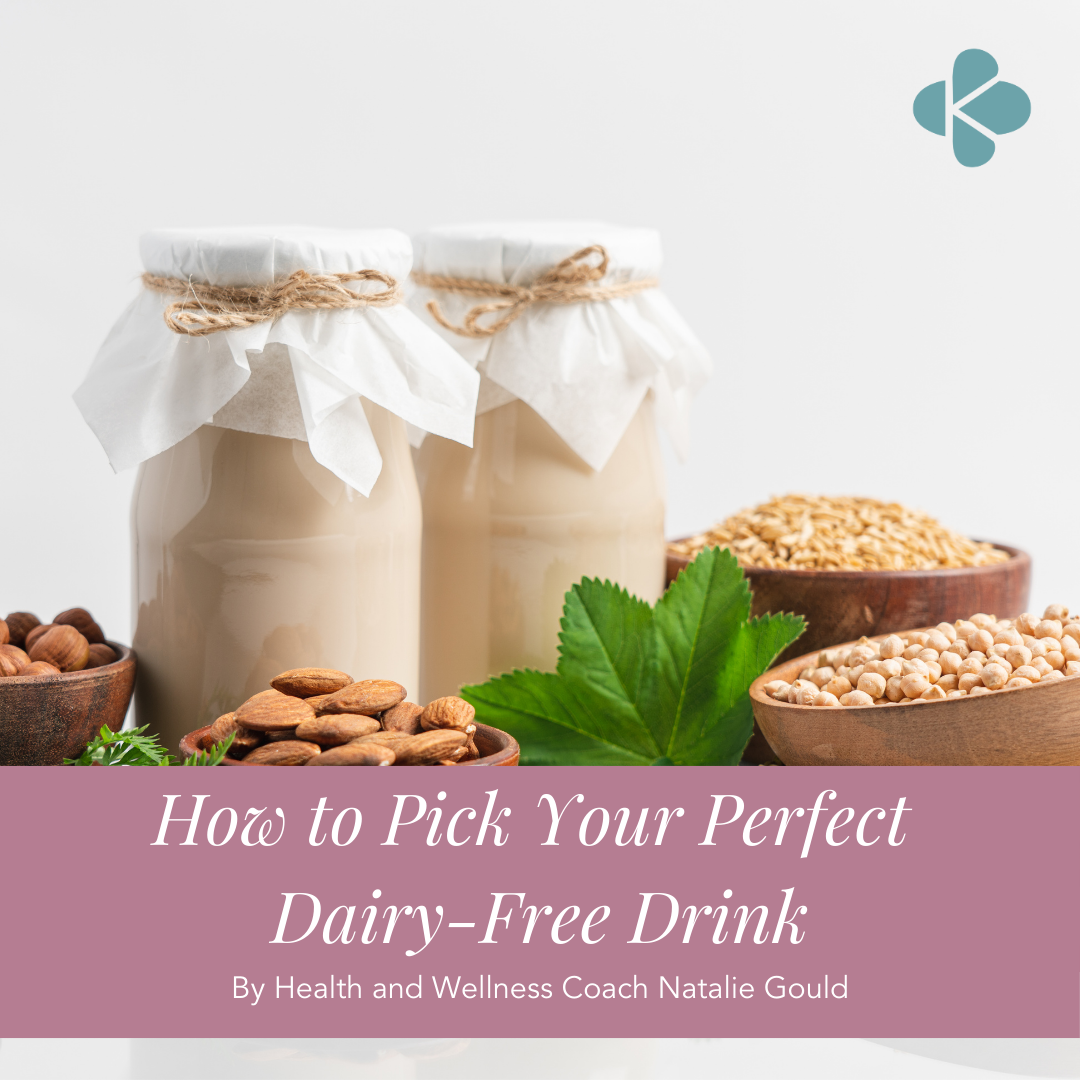Navigating the Plant-Based Milk Aisle: How to Pick Your Perfect Dairy-Free Drink
In recent years, the refrigerated section of grocery and health food stores have become increasingly crowded with a seemingly endless array of nut milks and other dairy free alternatives.
Rising rates of lactose intolerance, milk allergies and a growing interest in plant-based products are driving the explosive growth in this global market. Almond milk, oat milk, coconut milk, soy milk, sweetened, unsweetened, barista blend…the options go on and on.
We’re here to help break through the confusion.
Why use a plant-based milk? What’s the difference between the options available and how to choose? What about calcium? Lastly, we’ll share the brands we recommend and a couple of our favorite recipes.
Why Use a Plant-Based Milk?
Plant-based milks have become a popular choice for many not only for dietary needs, but also for the health benefits, potential environmental impact and the variety of options.
For those that have lactose intolerance, milk allergies or a dietary preference such as veganism, plant-based milks are a great alternative. Additionally, these milks tend to be lower in calories and sugar as compared to cow’s milk, although that is not always the case, so read nutrition labels carefully. One cup of 2% milk has 130 calories and 11 grams of sugar, compared to one cup of organic, unsweetened almond milk which has 60 calories and zero grams of sugar.
The production of plant-based milks also offer environmental benefits compared to cow’s milk such as lower greenhouse gas emissions, reduced water usage (soy and oat milks specifically), less land use and sustainable farming practices (hemp and pea).
Lastly, there are an endless amount of options to try based on your tastes and preferences - everything from hazelnut and pistachio milk to flax and soy milks.
Kinds and Benefits:
Plant-based milks are generally made with the same simple process - by soaking the plant source (if necessary), whether nuts, oats, soybeans, or seeds, filtering out any particles, and blending with water. In fact, it’s incredibly easy, and cost efficient, to make on your own (see recipes below). So how do you choose which kind is right for you?
Nut milks - Nut milks’ mild, nutty flavor makes it a great base for many fiber rich recipes like smoothies, overnight oats and chia pudding. While almond milk tends to be a bit thinner, cashew and walnut are usually thicker making them useful for blending into coffee, soups, stews and baked goods.
Oat milk - Oat milk’s creamy texture has made it a popular option in recent years, especially for use in beverages. However, read the ingredient label carefully, as they tend to have gums, emulsifiers and added sugars even if they are unsweetened.
Soy milk - Soy milk often has more protein than other plant-based milks, about 7 grams per cup. It is also a complete protein source with all nine essential amino acids, unusual for a plant-based option.
Seed milk (flax, hemp) - Made from flax or hemp seeds, these milks are great alternatives for those avoiding dairy, nuts and soy. With a naturally sweet and creamy taste, and offering a nutritious boost of protein, healthy fats and omega-3’s, these are a healthy option and are also easy to make at home.
Coconut milk - Note that coconut “beverage” sold in cartons is mostly water with some coconut and is much thinner than the canned variety. Canned coconut milk is usually half coconut cream and half coconut water and tends to be much higher in calories and saturated fat. Coconut milk beverage can be used similarly to nut milks, but will give a hint of coconut flavor.
What to Look For & What to Avoid:
With all these options, you want to look for milks that are organic, unsweetened and with minimal ingredients - ideally just the plant source such as almond, hemp or coconut, water and salt.
Avoid those with gums and emulsifiers like carrageenan, gellan gum and locust bean gum. While these thicken the milk and provide added creaminess, they also have a history of causing and exacerbating gastrointestinal symptoms like bloating, IBS and diarrhea.
Additionally you’ll want to avoid any added sugars. These are especially common in the flavored plant-based milks as well as those labeled “barista” or “extra creamy”. These varieties can cause unstable blood sugar, leading to low energy, cravings and brain fog.
Brands that check all the above boxes are Malk, Three Trees, Califia Farms (organic version), Elmhurst and Eden Foods.
When using plant-based milks in coffee and tea, adding a dash of cinnamon can provide a bit of sweetness with no added sugar. Additionally, using a handheld frother can help blend the liquids for a more consistent taste.
What About Calcium?
Some plant-based milks are fortified with added calcium, usually in the form of calcium carbonate, but these often come along with gums and emulsifiers. So you’ll want to make sure to get adequate calcium in your diet through other calcium containing foods such as chia seeds, canned salmon or sardines, beans and lentils, almonds, and leafy greens.
Experiment at Home
Nut and hemp milks are actually quite simple to make at home, require just a few ingredients and can be sweetened naturally with dates, cinnamon and/or vanilla extract. Enjoy this Dr. Katie approved almond milk recipes!
*This blog and website do not provide medical advice. It is intended for general informational purposes only and does not address individual circumstances. It is not a substitute for professional medical advice, diagnosis or treatment and should not be relied on to make decisions about your health. Always check with your own healthcare provider before taking a new supplement and before making any significant diet, lifestyle, exercise or other changes. Never ignore professional medical advice in seeking treatment because of something you have read on this site. If you think you may have a medical emergency, immediately call your doctor or dial 911.

